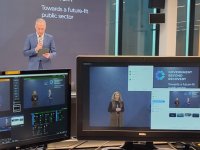Virtual Conference – Government Beyond Recovery: Towards a future-fit public sector: 18-19 October 2021 As we hurry to buy plane tickets to the next tropical destination or catch the latest James Bond movie in theatres, the sudden and dramatic restrictions we all experienced in early 2020 can feel like a distant memory. In the early days of COVID-19, many of us reflected critically on the things that mattered most in our lives and work; committing...
Global: European Commission Collaboration
Intermediary report launch Over the past year the Observatory of Public Sector Innovation (OPSI) has worked together with the Government of Finland and the European Commission to build an anticipatory innovation governance model. As part of the work, the OECD assessed the current public policy steering system of Finland and its anticipatory capacity – the first results of the work are presented in a report accompanying the blog. Building an anticipatory innovation governance model First,...
How do you manage a variety of innovation projects, with differing types of innovation, different goals, and perhaps different teams and funders? To avoid dealing with a mere list of projects, practitioners have recently become interested in innovation portfolio approaches. What we mean by innovation portfolios Portfolio management is an analysis and sense-making activity connecting innovation practice – specific projects, initiatives, and programmes – to the intent and purpose behind those…
European Border regions face obstacles in diverse domains, hampering cross-border interactions and development. b-solutions provides an innovative way to support border regions in identifying the root causes of obstacles and devising solutions pathways in two ways:
i) how public support is provided: a legal expert working directly with the beneficiary on a obstacle (i.e. no red tape+cost effectiveness)
ii) on each different solutions (legal revision proposals; agreements; revised procedures)
Much of what the public sector seeks to do through innovation aims at making life simpler for citizens: adapting to evolving needs while also improving agility in the design and delivery of programs and services. Over the course of the past year in particular, governments have been relying heavily on adaptive innovation and agile approaches to respond to the rapidly changing needs of society. On 8 June 2021, OPSI, with the support of the EU...
On May 11th 2021, OPSI hosted a workshop in partnership with the Austrian Federal Ministry for Civil Service and Sport on Enhancement-Oriented Innovation, as part of our ongoing work on the Innovation facets through our Horizon 2020 programme of research. Over 100 people representing 36 nationalities joined us to hear about the relationships between innovation and public sector efficiency and productivity, as well as methods and tools…
On March 11-12, 2021, more than 450 futures, foresight and innovation experts from 72 countries around the world gathered digitally to discuss the latest on anticipatory innovation governance. Over three sessions, the emerging Anticipatory Innovation Governance (AIG) model was explored, together with the future of the public sector, and tools and methods for anticipation. The series of sessions were co-hosted with the Government of Finland and supported by the European Commission’s Horizon…
Anticipatory innovation governance model – humble, yet ambitious Governments tend to look like powerful, overwhelming forces that are difficult to stop or change. Juggernauts if you will. Yet governments over decades have reformed a lot: they adopted new (and given away) services and tasks together with technological and societal development. They have taken on different public administration paradigms, successful and otherwise. The change, however, has been slow and, at times, painful. We all…
Tools and methods for innovation, anticipation, and strategic foresight are a perennially popular topic and several hundred members of the global public sector anticipatory innovation tools community gathered to take stock of promise and pitfalls of future-oriented tool and method landscape. On Friday 12 March, OECD OPSI organised the session as part of a workshop on Anticipatory Innovation Governance hosted by the Government of Finland with the support of the European Commission’s…
In April 1912, an icon set sail from Southampton, heading into the future and making history at the same time. The Titanic, “ship of dreams”, was the height of technological achievement. Retrospectively referred to as “unsinkable”, she might as well have been called “future-proof”, such was the confidence she commanded. We all know what happened. We also know the main lessons learned: lack of lifeboats, a chaotic evacuation, and doubts over whether a floating wooden...









